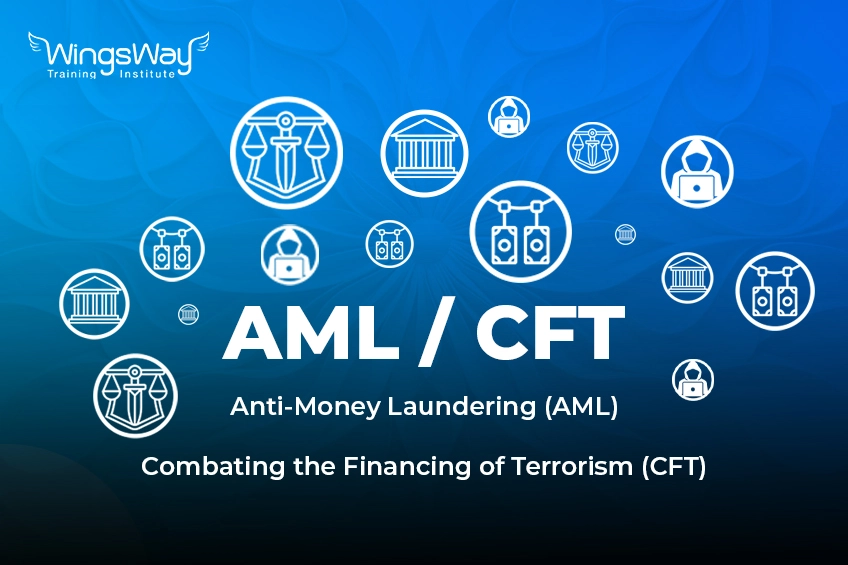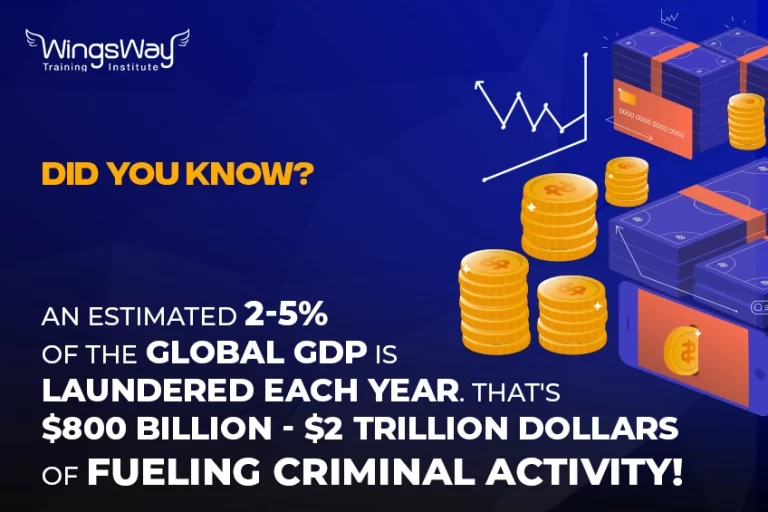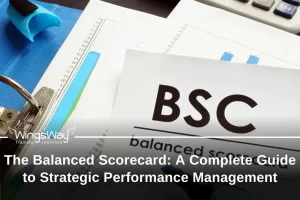
AML CFT: Meaning, Why it Matters, Why Build a Career?
- Posted by WingsWay Training Institute
- Categories Anti-Money Laundering, AML, Corporate Trainings, Finance
- Date 11/03/2024
AML CFT — or Anti-Money Laundering and Combating the Financing of Terrorism is a global effort to protect financial systems. To grasp the scale of the problem, consider this: the amount of money laundered globally each year is estimated to be 2-5% of the world’s GDP, which is approximately $800 billion – $2 trillion in current US dollars.
That’s a staggering amount, underscoring the importance of AML CFT in fighting financial crime. Let’s dive into what is anti-money laundering and why it matters.
Table of Contents
ToggleWhat is Anti-Money Laundering (AML) and Why Does it Matter?
AML refers to the laws, regulations, and procedures designed to prevent criminals from disguising illegally obtained funds as legitimate income. Think of it as putting safeguards in place to make it harder for criminals to profit from their activities.
Let’s break this down further:
Criminals need to “clean” their dirty money to use it without raising suspicion. This involves making it seem like it came from legal sources.
However, AML acts as a Roadblock!
AML puts safeguards in place to make it much harder for criminals to hide their money. Banks and other institutions have to know their customers, ask questions about unusual transactions, and report suspicious activity.
The Importance of AML Compliance
AML Compliance isn’t just about following the rules. It’s essential for protecting the integrity of our financial systems, safeguarding businesses, and contributing to a safer society.
Here’s why it’s crucial:
1. Protects the integrity of financial systems:
AML measures make it harder for criminals to infiltrate banks, markets, and other institutions, maintaining trust in the system. This is essential for a healthy economy.
2. Safeguards the reputation of businesses:
Companies with strong AML programs avoid costly fines for non-compliance and protect their brand image. No business wants to be associated with aiding criminals, even unknowingly.
3. Contributes to a Safer Society:
Let’s remember, that the money involved in money laundering often comes from crimes like drug trafficking, fraud, or even human trafficking. AML makes these crimes less profitable and harder to sustain, ultimately making society safer.
CFT Meaning: Disrupting Terrorist Financing
While AML focuses on the broad range of illegal activities, CFT, which stands for Combating the Financing of Terrorism, zeroes in on the specific threat of terrorist financing.
Terrorist groups need money to operate, recruit, and carry out attacks. Effective AML CFT strategies aim to cut off these funding sources, making it harder for them to function.
This involves tracking suspicious financial activity, freezing the assets of suspected terrorists, and working with international partners to share intelligence and coordinate efforts.

The Essential Stages of AML/CFT Compliance
Think of AML compliance as a series of detective steps, each one building on the last to uncover potential risks. Let’s break it down:
Know Your Customer (KYC)
This is the starting point. Financial institutions need to know who they’re doing business with. That means:
- Verifying Identity: Collecting documents like a passport or ID card to confirm a person is who they say they are.
- Understanding the Customer: What kind of business does this person or company do? Where does their money usually come from?
- Risk Assessment: Based on these factors, institutions assign a risk level. Someone running a small local bakery is probably lower risk than an international import-export company.
Enhanced Due Diligence (EDD)
For higher-risk customers, it’s time to look closer. EDD is like zooming in with a magnifying glass. It might involve:
- More Documentation: Requesting proof of a business address, bank statements, or the source of large deposits.
- Beneficial Ownership: If a company is involved, who are the real people who own and control it?
- Ongoing Monitoring: EDD isn’t just at the start; it continues throughout the relationship.
Transaction Monitoring and Reporting
This is where technology plays a big role. Systems constantly analyse transactions, looking for red flags like:
- Unusual Patterns: Does a normally small account suddenly see huge amounts? Are funds moving in a way that doesn’t fit the customer’s profile?
- Structuring: This means breaking down transactions into smaller amounts, which might be an attempt to get under the radar.
- High-Risk Geographies: Transactions with certain countries often receive extra scrutiny due to greater money laundering or terrorism risks.
If something suspicious pops up, it doesn’t automatically mean a crime is happening. But it triggers a report to authorities, who then investigate further.
Who's Involved in the Fight Against Financial Crime?
Think of the fight against financial crime as a team effort, with different players working together on various fronts:
Financial Institutions and Reporting Entities
These are the front lines! Banks, investment firms, insurance companies, money transfer services, and others that handle financial transactions are legally obligated to:
- Implement KYC Procedures: Know who their customers are and spot potential red flags.
- Conduct Transaction Monitoring: Use software and human analysts to analyse activity for unusual patterns.
- Report Suspicious Activity: File detailed reports to authorities when something doesn’t add up.
Regulators and the FATF
Let’s call these the rule-makers and coordinators:
- National Regulators: Each country has its own agencies (e.g., the Central Bank in the UAE) that set specific AML/CFT standards for businesses to follow. They enforce those rules through inspections and fines.
- The FATF (Financial Action Task Force): This international organisation develops the global AML/CFT framework. They issue recommendations that countries are expected to adopt into their laws. The FATF also evaluates how well countries are doing in combating financial crime.
AML Operations Professionals
The AML Operations Professionals are the specialists within organisations who make sure everything runs smoothly. Their responsibilities often include:
- Designing AML Compliance Programs: Creating policies and procedures that meet regulatory requirements but are also practical for the business.
- Training Staff: Everyone from tellers to senior executives needs some AML awareness.
- Overseeing Implementation: Making sure KYC, transaction monitoring, and reporting are done correctly and consistently.
- Staying Updated: AML regulations evolve, and these professionals keep up with changes.

Why Build a Rewarding Career in AML CFT?
AML isn’t just about regulations – it’s a dynamic field where you can make a real difference while building a fascinating career path.
Here’s why enrolling in an anti-money laundering course is a smart choice:
- In-Demand Skills: The need for AML experts isn’t slowing down. Financial institutions, corporations, and even governments need skilled professionals to combat financial crime. Developing this expertise makes you a valuable asset.
- Career Growth: AML offers room for advancement. You might start as an analyst, progress to managing a team, become a specialist in a niche area like sanctions compliance, or even reach executive leadership roles within the compliance field.
- Variety of Opportunities: Think beyond banks! AML professionals are needed across sectors like insurance, fintech, real estate, and more. Your skills are transferable, opening doors in many industries.
- Making a Difference: You won’t just be doing a job; you’ll be actively protecting the financial system, disrupting criminal networks, and contributing to a safer society.
WingsWay Training Institute: Your Partner in AML Expertise
Anti-money laundering training is an investment in your future. It’s your first step toward an exciting career protecting the financial system.
WingsWay Training Institute, an ISO-certified and award-winning institute headquartered in Dubai, is dedicated to empowering the next generation of AML champions.
Our comprehensive Anti-Money Laundering course provides:
- Essential Foundations: Understand the fundamentals of AML/CFT, global regulations, and how to apply them in the real world.
- Practical Skills: Learn how to perform KYC, assess risk, monitor transactions, and contribute to effective AML programs.
- Credentials and Recognition: Our courses can prepare you for industry-recognized certifications, demonstrating your expertise to potential employers.
Let WingsWay Training Institute be your guide. Explore our AML course and start building the skills and knowledge you need to succeed.
Connect with our Training Solutions Specialists today to take the next step in your anti-money laundering training!
- Landline: +971 4 222 0885
- E-Mail: [email protected]



